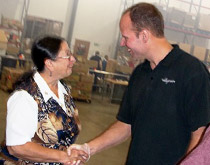
Dr. Hillard Lazarus (E'70) is a professor of medicine in the Department of Medicine, Hematology-Oncology Division of Case Western Reserve University, where he specializes in blood and bone marrow transplantation. He is widely regarded as a pioneer in the field of hematopoietic (non-embryonic) stem cell transplantation.
How is it that a Carnegie Mellon engineering student winds up going to medical school and doing the first mesenchymal stem cell transplant in the world in 1995?
Carnegie Mellon's always had a history of engineers tinkering around with biology and medicine. I remember going down to the basement of Porter to meet with a couple of graduate students who were studying how red blood cells flow in the microcirculation. They had this gigantic tank set up filled with glycerol, an oil-like solution, that they were using to mimic blood flow, and they were towing a wooden cylinder the size and shape of a tire through it to represent red blood cells. I remember thinking, "Okay, I'm hooked."
You entered medical school only two years after the world's first bone marrow transplant was performed. What convinced you to enter a field that was just in its infancy?
If I'm being honest, there weren't a lot of people at that time to butt heads [laugh]. ... I could do my own thing.
How do stem cells relate to bone marrow transplants in cancer patients?
[Chemotherapy] , in theory, kills the cancer but also damages blood production. The infusion of donor cells replenishes the marrow, giving a patient's body a chance to repair and replenish itself.
So what about the controversy over embryonic stem cells?
It has no bearing on the kind of work I do. Really, the vast majority of stem cells being worked on these days aren't embryonic. The cells I work on, derived from the blood and bone marrow, are harvested almost entirely from living, adult donors.
Where do you see the future of stem cell research?
Oh, the sky's the limit. Regenerative medicine using living cells hopefully will make organ transplantation obsolete-investigators will just grow them. We're getting very close to the point where we can manufacture proteins, re-grow failing or dead cells, restore a person's body tissue. ... We're truly right at the cusp of a new era in medicine.
-Bradley A. Porter (HS'08)



